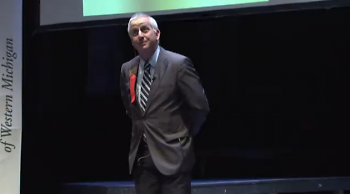The World Affairs Council of West Michigan and several local academic institutions hosted the third Great Decisions Foreign Policy Lecture Series last Monday evening at Aquinas College’s Fine Arts Center. The lecture was presented by Dr. Gunther Hega of Western Michigan University’s (WMU) Department of Political Science, a last minute replacement for his friend Dr. Jackson Janes of the American Institute for Contemporary German Studies at Johns Hopkins University who was unable to present due to weather-related travel problems. Luckily for the attendees, Dr. Hega’s presentation, Germany Rising, is almost identical in content to Jackson’s.
Dr. Hega is an Associate Professor in the Comparative and European Politics Department of Political Science, Western Michigan University and a German-national. "I was born in the German Province of Swabia,” he said, “home of the Poets Schiller and Hoelderlin, on All Saints Day, in the year the Berlin Wall was built." Hega has been with Political Science Department at Western Michigan University since 1994. He got his degree in Germany at Tubingen and his PH.D at Washington University. He was honored in 2004 by the Political Science Honor Society for "Outstanding Teaching." Dr. Hega also has a recent Book on "Consensus Democracy", and has written for many journals and publications concerning this field and is currently conducting several related research projects.
In Germany Rising, Hega provided a summary of the recent rise in fortune of Germany. Hega began by establishing the climate of the current global economic crisis, where nations have experienced great hardship.. From the housing market derivative crisis in the U.S., record unemployment, currency devaluation, and countries on the brink of bankruptcy around the world, Dr. Hega painted a bleak picture for most nations in the European Union at the end of the decade, particularly for Greece and Ireland who had suffered the most economically.
Until 2010, Germany was no exception, Hega explained. But something happened. Hailed as “Germany’s Economic Miracle, the nation experienced unparalleled growth in that year, with an 8.3% increase in gross domestic product (GDP - a common indicator of a nation's quality of life), decreased unemployment, and a trade surplus of 11.2% from 2009 to 2010. So, how does one country change from depression to economic miracle overnight?
Dr. Hega explained that much of Germany’s recent success can be attributed to trade with China and how the nation has dealt with union powers. In fact, Hega explained, the unions have been a central partner in Germany’s great comeback. In Germany, government, business and the unions all sit in on negotiations. Labor gave up cost of living raises, business set schedules for workers to work unpaid overtime in good times, paid back with time off in bad times. This resulted in very few workers needing medical or unemployment insurance from the German government. Hega clearly explained that the government does not question that employees have a right to get paid, or that businesses to make a profit. The stake of the Government is legislated. As a result, no one has had an unfair advantage.
The Euro, along with most of the world’s currency, is tied to the American Dollar, and fell apart along with it. Luckily, Angela Merkel, Chancellor of Germany, was able to respond more quickly than most other European leaders and develop policy that helped rework the nation’s manufacturing priorities. One thing that Germany focused on was developing and selling technology critical to manufacturing products, instead the products themselves. According to Dr. Hega, the United States has historically avoided exporting technology, which gave Germany a distinct advantage. According to Hega, this was, however, one example in "a matter of many small things, that happened over time." The Professor quickly pointed that this economic turn around isn't easily mimicked, and likely could not be repeated.
The Great Decisions Foreign Policy Series continues tonight with a panel discussion entitled Payback Time? The Global Financial Crisis, with an all start group of panelists including moderator Jack Lessenbury (Senior Political Analyst) as Moderator, Dr. Hari Singh (Grand Valley State University), Dr. Harry Veryser (University of Detroit) and Dr. Gary Wolfram, (Hillsdale College). The discussion will be held on begin tonight at 6p.m. at the Performing Arts Center at Aquinas College (1607 Robinson Road SE). Admission for the discussion is $5 for World Affairs Council members and students, and $10 for non-members.
For more information about the Great Decisions Foreign Policy Series, check out the World Affairs Council of Western Michigan website.
The Rapidian, a program of the 501(c)3 nonprofit Community Media Center, relies on the community’s support to help cover the cost of training reporters and publishing content.
We need your help.
If each of our readers and content creators who values this community platform help support its creation and maintenance, The Rapidian can continue to educate and facilitate a conversation around issues for years to come.
Please support The Rapidian and make a contribution today.

